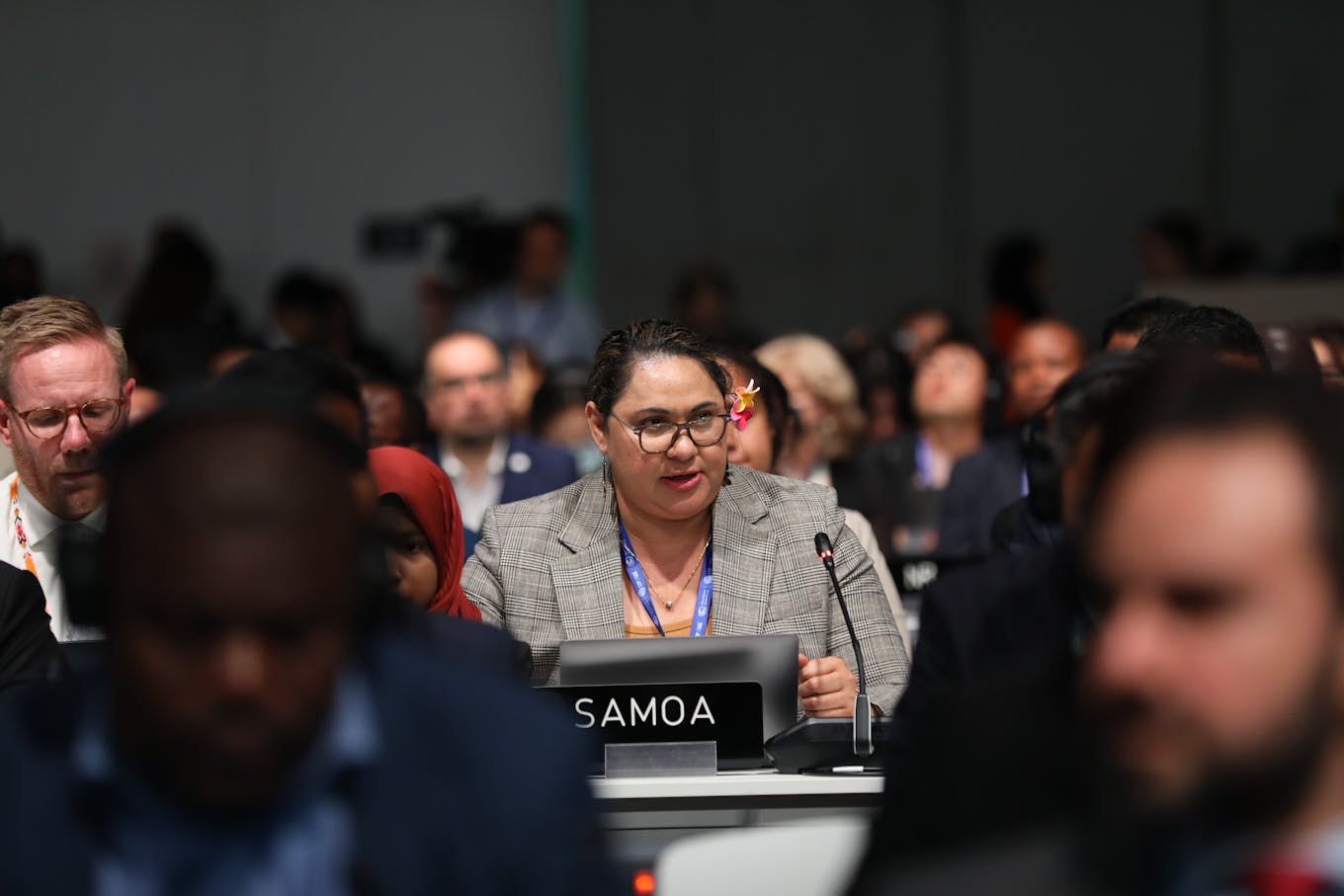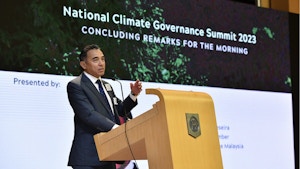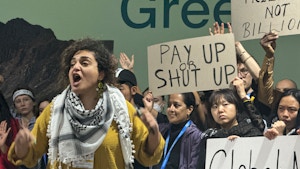A landmark deal was announced on Wednesday by COP28 president Sultan Al Jaber, in which 198 countries agreed to a much-debated text that called on signatories to “transition away from fossil fuels to reach net-zero” and included a new target to triple renewables and double energy efficiency by 2030.
To continue reading, subscribe to Eco‑Business.
There's something for everyone. We offer a range of subscription plans.
- Access our stories and receive our Insights Weekly newsletter with the free EB Member plan.
- Unlock unlimited access to our content and archive with EB Circle.
- Publish your content with EB Premium.
“Over the last two weeks, we have worked very hard to secure a better future for our people and our planet. We should be proud of our historic achievement,” said COP28 president Dr Sultan Al Jaber.
All eyes were on the final wording of the world’s first global stocktake, which represented the culmination of negotiations that ran over two weeks in the capital of the United Arab Emirates. For weeks, parties had debated the inclusion of the words “phase out” of fossil fuels, which many civil society groups and climate-vulnerable countries were demanding. Only unabated coal power was subject to a “phase down” in the final text.
“While we didn’t turn the page on the fossil fuel era in Dubai, this outcome is the beginning of the end,” said UN Climate Change Executive Secretary Simon Stiell in his closing speech. He described the raft of initiatives announced at COP28 as a “climate-action lifeline, not a finish line” and urged governments and businesses to turn their pledges into real-economy outcomes without delay.
While Jaber defended the text, dubbed the UAE Consensus, as being “led by science”, “built on common ground” and “strengthened by inclusivity”, mixed feedback poured in from environmental and climate groups as well as representatives from small island states, which appeared to have been left out of the event’s conclusion.
“We didn’t want to interrupt the standing ovation, but we are confused. It seems you just gavelled the decision and the small island states were not in the room,” said Anne Rasmussen, Samoa’s lead negotiator and representing the Alliance of Small Island States.
She went on to say that despite having many good elements, document contained a “litany of loopholes” and was merely an “an incremental advancement over business as usual”.
This view was echoed by environmental non-governmental organisations. Stephen Cornelius, WWF global climate and energy lead said the final text was a “sorely needed improvement” compared to a previous version but that the language on fossil fuels still falls short of calling for the full phase-out of coal, oil and gas.
At E3G, an independent climate change think tank, programme lead Alex Scott said, “There are gaps —especially on finance for adaptation — and loopholes, but the ultimate direction of travel is clear: the fossil fuel era is ending.” The proof, he said, will be in the delivery of country-level climate plans, due by 2025, and transformation of the financial system to deliver the economic shifts needed.

Anne Rasmussen, Samoan lead negotiator representing The Alliance of Small Island States, said that the COP28 deal had a “litany of loopholes”. Image: UNFCCC / Flickr
Asia calls for transition finance
While climate finance featured heavily throughout COP28, critics pointed out that the global stocktake lacked mechanisms or pathways to ensure that funding flows to developing countries most in need of support. “The missing element…was a clear financial package for countries embarking on their energy transition as well as clarity about how to fill the adaptation finance gap,” said Laura Sabogal Reyes, senior policy advisor at E3G.
Instead of accusing petrostates in the Global South for “holding COP28 drafts at ransom”, equal spotlight should have been given to the fact that rich nations have failed to provide adequate funding for global adaptation and mitigation, especially those that continue to produce oil, said Faroze Nadar, UN Global Compact executive director for Malaysia and Brunei on Linkedin.
Calls of the UAE Consensus
The UAE Consensus called on countries to contribute to global climate efforts, taking into account the Paris Agreement and their different national circumstances.
Here is a summary of the eight calls in the document:
1. Tripling renewable energy capacity and doubling the rate of energy efficiency improvements by 2030
2. Accelerating efforts towards the phase-down of unabated coal power
3. Accelerating efforts towards net-zero emission energy systems, well before or by around mid-century
4. Transitioning away from fossil fuels in energy systems, in a just, orderly and equitable manner
5. Accelerating zero- and low-emission technologies
6. Substantially reducing non-carbon-dioxide emissions globally, including in particular methane emissions by 2030
7. Accelerating the reduction of emissions from road transport
8. Phasing out inefficient fossil fuel subsidies as soon as possible
Acknowledging Malaysia’s heavy fiscal dependence on oil and gas revenue, Nadar welcomed the deal’s recognition of the need for a just transition away from fossil fuels. “I cannot imagine or stomach losing income that finances a third of our annual country budget, without being provided the opportunity for (a) time-bound plan to plug the hole [left by phasing out fossil fuels],” he said.
Indonesia’s representatives also pointed to a similar need for the development pathways of developing countries to be recognised. “The specific language on transitioning away from fossil fuel must be understood in the context of different national circumstances, pathways, and approaches in line with the principle of the Paris Agreement,” said the country’s delegate. “We need concrete implementation.”
The UAE Consensus, instead of being viewed as a “North Star”, must be considered as the minimum for countries in transitioning away from fossil fuels, said Marc Allen, co-founder of Singapore-based Unravel Carbon. “In practice, this will mean that Asia, Southeast Asia, as well as Australia, Europe and the US need to be putting plans in place to minimise their usage, production and usage of fossil fuels in the future,” he told Eco-Business.
According to Al Jaber, COP28 as a whole mobilised more than US$85 billion in climate financing, including the establishment of a global loss and damage fund that came up. Allen said there were discussions on the sidelines of the conference about how countries’ climate commitments could be used to leverage private investments, whether through blended finance or public-private partnerships.
“Putting all of the burden on public finances is not going to happen, I don’t think there’s enough money there,” said Allen. Singapore, he said, would have a big role to play in terms of channelling climate finance in the region, as it could be a model for governance structures and a strong financial system.














